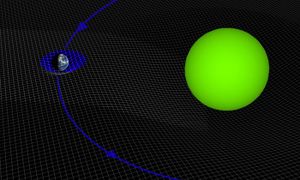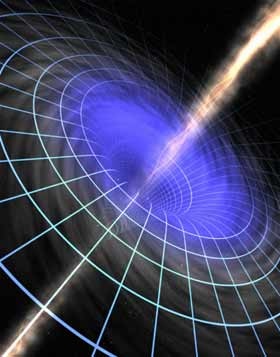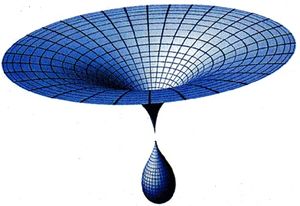(Created page with "This drive system works by displacing a ship through a warp in space-time created by manipulating existing gravitational fields. By manipulating an existing gravitational fie...") |
|||
| Line 5: | Line 5: | ||
[[file:gravity-bridge.jpg|thumb|Gravitational Bridge]] | [[file:gravity-bridge.jpg|thumb|Gravitational Bridge]] | ||
[[file:gravity-bubble.jpg|thumb|Spacial Bubble]] | [[file:gravity-bubble.jpg|thumb|Spacial Bubble]] | ||
To displace a ship it is enclosed in a bubble of spacetime, separating it from the surrounding (normal) spacetime using high energy [[Lygon | To displace a ship it is enclosed in a bubble of spacetime, separating it from the surrounding (normal) spacetime using high energy [[Lygon Particles|lygon]] infused plasma generated by an [[Oscillating Mercury Core]] and routed to large field coils that create the actual bubble. This bubble is then displaced through an artificially shaped gravity well to end up in some remote region. The displacement is instantaneous for those within the bubble and takes less than half a second from the perspective of those outside the bubble. | ||
This technology is similar to [[Spacial Slipstream Drive]] where the same kind of bubble system is used to a different effect. | This technology is similar to [[Spacial Slipstream Drive]] where the same kind of bubble system is used to a different effect. | ||
Revision as of 22:42, 11 December 2015
This drive system works by displacing a ship through a warp in space-time created by manipulating existing gravitational fields. By manipulating an existing gravitational field a vessel is displaced through spacetime effectively jumping from one point to another.
Principles



To displace a ship it is enclosed in a bubble of spacetime, separating it from the surrounding (normal) spacetime using high energy lygon infused plasma generated by an Oscillating Mercury Core and routed to large field coils that create the actual bubble. This bubble is then displaced through an artificially shaped gravity well to end up in some remote region. The displacement is instantaneous for those within the bubble and takes less than half a second from the perspective of those outside the bubble.
This technology is similar to Spacial Slipstream Drive where the same kind of bubble system is used to a different effect.
Operation
This bubble is specifically shaped the field modulated to create a momentary quantum echo effect so the bubble exists in a finite moment in time suspended both inside the gravity well and as a quantum-energy projection at a distant location in spacetime. As the field collapses the shape and direction of the well displaces the matter into the projection leaving only a fading energy signature behind. The energy signature lasts only moments after the displacement, though the act of displacing creates a large and distinct sensor echo visible across 2 parsecs.
Size of Gravitational Field vs Maximum Distance
- Planetoid or Moon
- Unsafe
- Solid Planet
- Approximately 1.5 AU Limit
- Gas Giant
- Approximately 1500 AU Limit
- Main Sequence Star
- 6 ly Limit
- Collapsed Star
- 32 ly Limit
- Neutron Star
- 22 pc Limit
- Singularity
- 52 pc Limit
Using objects with gravitational fields smaller than a main sequence star is problematic, using the drive too close to a planets atmosphere can also have disastrous effects and is restricted to emergency situations only inside civilized space. While navigating in space using this drive, it should also be noted that potential sources of gravity to jump with should be considered as jumping without a gravity well is not possible.
Limitations
- If a displacement is attempted inside hyperspace the result is a catastrophic reaction which implodes the space within the bubble into a super-dense heated plasma.
- The larger the ship the more difficult it is to create and manipulate the bubble and lygon-field and the higher the chance of severe damage or destruction by an unstable bubble collapsing prior to displacement or the bubble is stable but improperly shaped causing the bubble to displace randomly in space-time ending up whole but at any place and potentially any time (though the last is only theoretical).
- The difficulty and energy required required to displace to any given place is reduced by using a stronger gravity well. Thus a smaller ship can get away with using the gravity well of a star or even a large gas giant to safely travel the same distance that a larger ship would need to get in close to an even larger star or super-dense stellar phenomena such as a neutron star or quantum singularity to travel.
- Because gravitational forces drop proportionally to distance from the gravitational source, it is possible to improve performance by getting as close as possible to the source of a gravitational field. Getting too close to the source of a gravitational field is extremely hazardous! Many ships have been lost attempting extreme jumps by getting too close to neutron stars or quantum singularities and doing so should not be attempted beyond established safety guidelines.